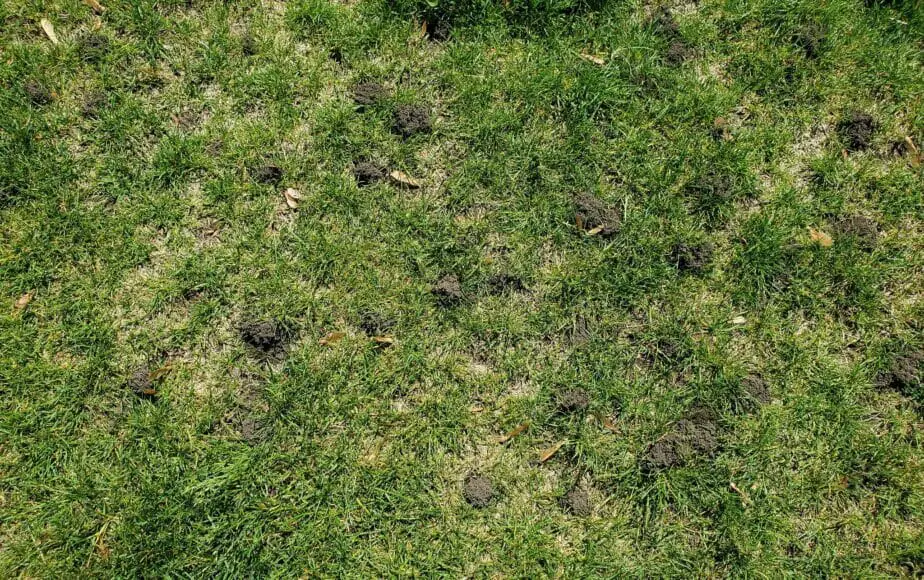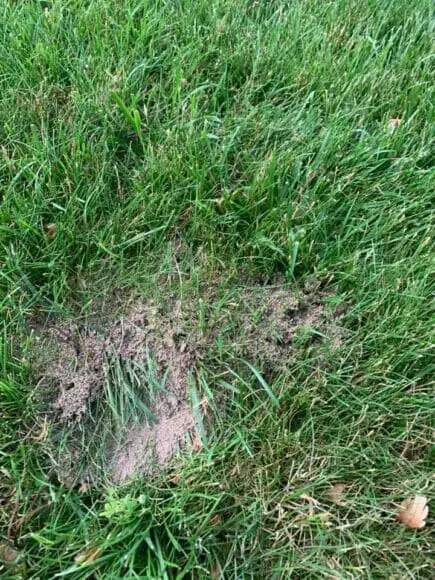You’ve spent the fall and winter seasons totally free from pest activity. But as the weather starts to warm up and the growing season reappears, you’ve spotted dozens of new ant mounds all over the yard.
What happened? And why are there so many ant hills in your yard?
The truth is that ants don’t have a single entrance or exit that lead to their underground nest. Most species prefer to build multiple access points, which look like small hills around sidewalk cracks, driveway edges, and surrounding grasses. You have so many anthills around your property because a single ant colony has begun to build new access points (AKA ant hills) — and it’s only a matter of time before things get even worse.
Thankfully, it’s not impossible to remove unsightly ant mounds from your property or even get rid of the ant population causing the problem in the first place. Let’s take a closer look at how to remove ant hills from your lawn, including some experimental ant mound treatments, ant infestation control, and FAQs to help you get started.
Table of Contents
Why Worry About Removing Ant Hills From Your Yard?
Maybe you only have an anthill or two around your backyard. This doesn’t seem like too much of a problem. Why even worry?
The truth is that ants build and bud into more colonies whenever conditions are right. That means one anthill today could become 15 tomorrow as the ant colony grows. If you don’t control your current ant issue, the existing colony may split in two, which could double your ant populations in just a few months.
There are other reasons you should consider removing ant hills from your yard. For example:
- Ants pose physical threats to people, pets, and properties. For example, some ant species (like the fire ant) cause painful stings that may lead to allergic reactions. Other species, including odorous house ants, can spread germs and bacteria throughout your home.
- Ant hills can reduce your curb appeal and lead to dead grass, muddy patches, and unusable patches of yard. This might make it difficult to perform regular lawn care, as the sediment of an ant colony could dull mower blades and even create a tripping hazard out in the yard.
- Many ants are food sources for unwanted lawn pests, including black widow spiders, snakes, and woodpeckers. Left long enough, you may have a full ecosystem of dangerous or destructive animals right outside your door.
Worried? Don’t be. It’s not hard to get rid of ants or their hills — especially armed with the right tools.



How to remove ant hills in your lawn
There are two strategies for removing ant hills in your lawn: by hand or by water.
Here’s how they work:
- By hand: Some ant hills can be destroyed by simply raking all mounded dirt to the ground. This shows ants that your lawn is not a safe place to nest and prevents compaction from affecting your soil. Once the hill is flat, you can apply more dirt and new grass seeds to eliminate the damage completely.
- By water: Use your garden hose to continuously soak ant mounds around your yard. This floods the ant nest and flattens out the hill, driving the colony away while supporting the health of your grass.
As you can see, getting rid of ant hills isn’t all that complicated — but if your ant populations are higher than normal, addressing the mounds might not make a difference. Ergo, the best way to remove ant hills naturally is to remove the ant infestations causing them in the first place.
How to get rid of (kill) ants in your lawn
Ants are an extremely prolific pest that are almost impossible to completely exterminate. That said, you can still limit your exposure to certain ant colonies by removing attractant factors that may have brought them to your yard.
There are two different ways to go about killing ants in your yard: home remedies, or products with an active ingredient.
Getting rid of ants with natural methods (natural ways)
If you’re concerned about the use of chemicals in your yard, you can opt for ant removal via natural methods.
You have several options:
- You can get rid of anthills by using spice. Try sprinkling garlic powder, bay leaves, or black pepper around the tops of anthills. Alternatively, you can use essential oils like cinnamon, clove, and mint. Strongly scented liquids like vinegar are another great way to discourage ant infestations.
- You can use modified water to kill ants on contact. For example, steaming-hot water poured down anthills can destroy any ants underneath the soil. You can also use soapy water to suffocate ants instantly. Just remember that both tactics can harm your grass and soil.
- Finally, you can mix boric acid (AKA Borax) with ants’ food. Combine a teaspoon of boric acid with a cup of bait (like maple syrup, sugar water, or peanut butter) to get started. Next, pour it into a jar with tiny poles punched into the top. Now all you have to do is set your trap outdoors. Be sure to put it as close to ant trails as possible.
Getting rid of ants with insecticides (chemicals)
If you’re less concerned about chemicals in your yard and would instead get down to business, you can always rely on ant-specific insecticides.
You have a couple of different options:
- Spray-on ant insecticides are extremely easy to find. Some of the best brands include Taurus SC, a fast-acting ant killer spray, and Navigator SC, a solution for both termites and ants.
- You can also kill ants with granular treatments. Revenge Ant Killer Granules are always a safe bet, although you could also rely on Bifen LP Granules to target fire ants (as well as other ants) in the yard.
- Using bait stations can be highly effective against fire ants, red ants, and many other pests in the lawn. The Complete Ant Bait Kit has everything you need to start, although you could also purchase just the bait with Optigard Ant Bait Gel.
How to prevent ants and colonies from returning
Do you keep finding ants coming into your yard? You may inadvertently create the perfect environment for both ant nests and their occupants.
To prevent an ant infestation from reappearing on your lawn, you may want to:
- Eliminate possible food sources. This includes cleaning up the porch from crumbs or spills, replacing your garbage can with a newer model, and removing other insects that ants may rely on (like aphids, since ants protect aphids).
- Get rid of standing water. Although ants prefer to nest in well-drained soil, they will have trouble supporting their colony without easy access to water. Start by emptying fountains and bird baths, then fill in any low points with topsoil. You’ll find ants decide to leave for greener pastures without water and will probably take their whole colony with them.
- Invite certain beneficial insects to prey on ant nests and their occupants. The praying mantis, for example, is a gardener’s best friend, and whole egg sacks can be purchased and raised for release.
If none of the above methods work, consider chatting with a pest control professional about faster-acting or off-market solutions.
Ant Hill FAQs
Have some questions? We’ve got some answers. Check out our anthill removal FAQs below.
What species of ants create an ant hill?
Most ants living underground must create ant hills to survive. In the US, this includes species like:
–Fire ants
-Red ants
-Pavement ants
-Odorous house ants
Please keep in mind that some ant species never leave mounds around the yard. For example, carpenter ants live inside wooden objects and do not burrow in the ground.
How do I get rid of multiple ant hills in my yard?
The best way to get rid of multiple ant hills is to target the actual ant colony and nest. Start by applying natural or chemical treatments (like bait) to reduce the population. Next, use integrated prevention steps to discourage future infestations and keep ant nests away permanently.
What does a lot of ant hills mean?
Ant hills are natural doorways to the complex structures beneath our feet. A lot of ant hills mean your yard may be struggling with an ant infestation.
For example, a single ant colony can have between 40 to 150 mounds per acre. However, if your yard has been infested by multiple queens and colonies, you can have up to 200 mounds per acre or more.
How do I permanently get rid of an ant hill?
The only way to get rid of an ant hill permanently is to completely remove ants from your yard. This means applying natural or chemical pest control treatments to reduce your overall ant population. If you don’t want to use over-the-counter products, you can use boric acid, soapy water, or even boiling water on specific ant hills.
Should I kill an ant hill?
The longer you wait to get rid of an ant hill, the longer it remains a problem for you, your loved ones, and your grass. You can pour boiling water on the ant colony to temporarily remove the ant hill. Alternatively, you can use chemical or natural methods to get rid of the ant colony in question — permanently destroying the ant hill.

